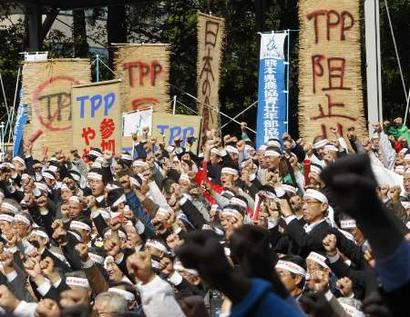Gov’t gets mixed responses on Pacific FTA in 1st public dialogue

Mainichi Daily News | 27 February 2011
Gov’t gets mixed responses on Pacific FTA in 1st public dialogue
SAITAMA (Kyodo) — The government began a series of debate forums Saturday nationwide to win public backing for its policy of pursuing freer trade, at a time when concerns are growing that Japan’s possible participation in a Pacific free trade pact may negatively affect the farm sector and other aspects of everyday lives.
Reflecting the fact that joining the negotiations for the Trans-Pacific Partnership is controversial in Japan, pros and cons were heard from participants who attended the first forum held in Saitama city, as well as complaints that not enough information on the TPP is being provided to the public.
Apparently to counter such government-organized events, which will continue through the end of March, opponents of the TPP from political and academic circles also started holding events to exchange views with ordinary citizens.
Japan plans to decide around June whether to join the TPP negotiations and work out measures for reforms of the agricultural sector necessary to join the pact. But opposition lingers especially in the farm sector as a possible influx of cheap agricultural imports could hit farmers hard.
"An extremely important vehicle to ensure Japan’s economic growth is free trade agreements. Japanese people should once again look overseas," national policy minister Koichiro Gemba told the forum, adding that it is essential for the country, facing a declining population, to incorporate the energy of Asian countries in seeking its own growth.
He also said the TPP is the only regionwide free trade initiative that is currently being negotiated by Asia-Pacific countries, including major agricultural exporters United States and Australia, and added that how Japan deals with the framework could affect the country’s future course.
While government officials have earlier stressed that the debate forums are not specifically to discuss the TPP, most of the questions from the floor were linked to the matter.
"I support joining the TPP negotiations," one university student said, explaining that he believes Japan’s farm products have the potential to sell well in China and other countries.
But another person from Gunma Prefecture said he is concerned about how the TPP would affect not only the farm sector but other areas, given that the free trade pact is intended to cover rules on investment and services liberalization.
"I feel it is kind of reckless to decide in June on whether to join the TPP talks. I hope the government will discuss the matter carefully and provide us with sufficient information," he said.
Gemba promised to offer as much information as possible to the public, but admitted it would be difficult for Japan to obtain "real information" unless it becomes a TPP negotiating member.
Japan has protected so-called "sensitive products" in agriculture such as rice and wheat with tariffs of more than 200 percent. But if Japan wants to join the TPP, it would likely have to drastically open up its agricultural market as the TPP is intended to require members in principle to scrap all tariffs.
The business community, meanwhile, is supportive of the TPP as the agreement would likely help boost exports by Japan’s automobile and electrical machinery makers.
Divisions also exist among members in the government and the ruling party over the TPP issue.
On Thursday, some ruling Democratic Party of Japan lawmakers, who are reluctant about joining the TPP talks, launched a group with experts to urge the state to take a cautious stance.
The group held its first public dialogue meeting in Kofu, Yamanashi Prefecture, on Saturday, in which many participants criticized the insufficient information disclosure by the government on the TPP issue.
Masahiko Yamada, a former farm minister and a House of Representatives member of the DPJ, warned that a decision on whether to join the TPP may "change the shape of the country" as it may have an impact also on medical services and other areas.
One of the participants said, "By joining the TPP, I am afraid that our culture, and even history, may be affected."





